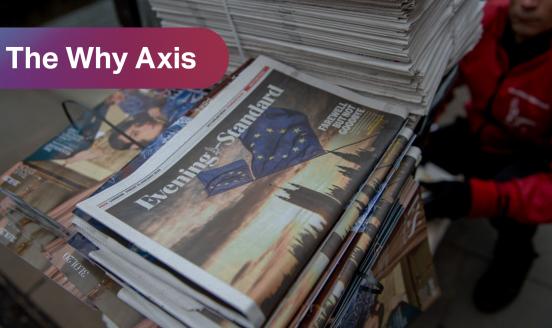Financial Regulation: A New Fortress Europe
EU policy leaders are becoming increasingly aware that the necessary re-regulation of Europes financial system must not be allowed to lead to a damaging fragmentation of its internal market for financial services. However, they still seem oblivious of the risk of global financial fragmentation inherent in some of their regulatory initiatives, however well-intended. In his monthly column, Senior Fellow Nicolas Véron takes a brief look at the difficult and complex corresponding trade-offs.
Cross-border integration of financial institutions and markets in Europe has been the major factor determining the shape of the European Union’s financial regulatory initiatives during the 2000s. A major legislative package rolled out after 1999, for example, contributed to the removal of barriers that until then had kept much of Europe’s financial activity largely national.
When the current crisis erupted, Europe’s financial integration, while still uneven, was vastly more advanced than it had been a decade earlier. In Central and Eastern Europe, most banks had been purchased by Western European groups. Wholesale market activity had become increasingly concentrated in London, to the relative detriment of continental centers like Frankfurt or Paris.
The economic impact of this integration is difficult to assess but likely to have been positive. It especially helped channel massive credit flows that fueled rapid catch-up growth in the newer member states, a phenomenon consistently documented by the European Bank for Reconstruction and Development, among others.
From a policy perspective, financial integration was largely achieved through liberalization. Regulatory barriers to entry, such as those that granted national monopolies to incumbent stock exchanges, were dismantled. National supervisors were prevented by the European Commission’s competition services from blocking bank mergers on the basis of nationality.
There was a remarkable consensus transcending partisanship on this agenda in individual member states and in the European Parliament. Lobbying by the financial industry played a role, of course. But arguably the main enabler was the shared political aim of building a single market, for which liberalization was seen as the only realistic means, because countries were not ready to create federal EU-level regulators, let alone delegate them any strong powers.
The crisis has changed all that. It granted renewed prominence to policy objectives given lower priority in the previous era, most obviously financial stability. Government intervention and “reregulation” became the new imperatives. Because the key means of action, such as supervisory capacity and taxpayers’ money, remained located at the national level, the crisis response tends to spur financial fragmentation along national lines, or the reversal of integration that had taken place before.
The implication is that sustainable cross-border integration now requires reform of the policy framework, with more authority placed at the EU level. Britain’s top financial regulator, Adair Turner, memorably declared last year that “we need either less Europe or more Europe” to preserve financial stability—and policymakers seem to have broadly chosen the latter to retain the benefits of a single market. This explains the unprecedented decision in 2009 to create EU-level financial supervisory authorities, even though important aspects of the corresponding legislation are still under discussion.
This is only part of a larger story, however. The drive toward reregulation creates potential risks to financial integration not only inside the European Union, but also between it and the rest of the world. In their effort to prevent the reappearance of internal barriers, policymakers could easily neglect the possibility of creating external ones. EU regulatory initiatives may create new obstacles to global financial integration.
If this sounds far-fetched, just consider the recent evidence. The newly introduced EU regulation of rating agencies risks impairing the global consistency of their risk assessment methodologies. The proposed regulation of private equity and hedge funds will probably restrict access to the European market for funds managed outside the EU. To regulate derivatives the European Commission has insisted on the need for separate clearing houses or exchanges on both sides of the Atlantic, which may partly split these markets along regional lines. Each of these moves could fragment the global financial system, even if such was not the initial intent and irrespective of the merits of such steps.
Similarly, the EU seems increasingly uncomfortable with global financial rules and standards. After having played a key role in promoting the use of international accounting standards, its recent and partly successful attempts at controlling their content put the entire venture at risk. In addition, after having long championed global bank capital standards, Europeans are distinctly unenthusiastic about the latest proposals of the Basel Committee on banking supervision.
The tension is by no means unique to Europe. The United States often regulates unilaterally, the latest example being the proposed “Volcker rule” that would separate banking from proprietary capital management, whose international implications are far from clear yet. In the meantime, however, the focus on internal cohesion has made the European Union appear oblivious to the international implications of its own recent initiatives. In G-20 summits, European leaders still call more than Americans or Asians for international regulatory harmonization. But their airy rhetoric rings increasingly hollow.
The risk for the European Union is either to contribute to global fragmentation, or to be marginalized if other regions keep integrating. Financial reregulation is not uniformly incompatible with international integration, and where it is, some external barriers may be an inevitable price to pay. But the corresponding trade-offs should be clearly acknowledged. For Europe’s leaders, this means some hard choices ahead.
Nicolas Véron is a Senior Fellow at Bruegel, and a Visiting Fellow at the Peterson Institute for International Economics.
This op-ed was published in the Turkish weekly Referans, the French newspaper La Tribune, Forbes Russia and the Chinese Caing.com.



